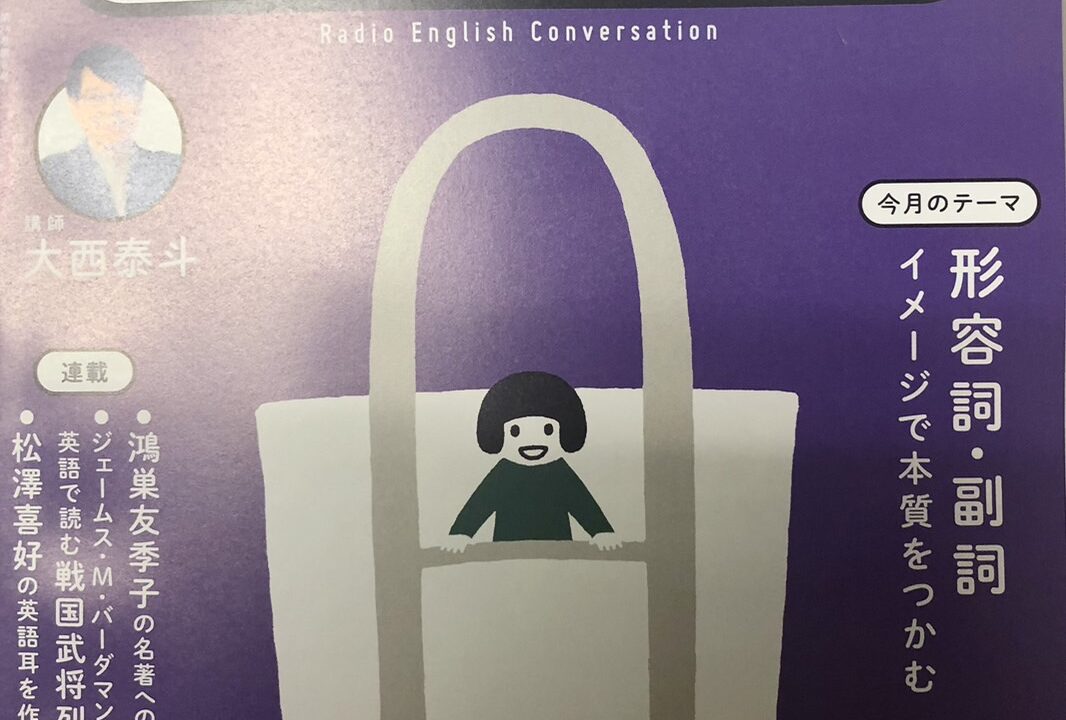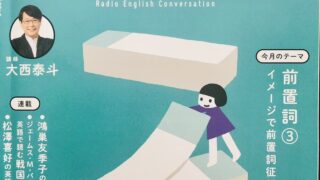【ラジオ英会話】Lesson 157 too, rather のイメージ – November 22 Tuesday, 2022

November 22 Tuesday, 2022
Lesson 157 too, rather のイメージ
☆Words & Phrases
**snore:
I heard you snoring in the theater. – Was I snoring?
**sleep through:
**scene:
I can’t believe you slept through the most important scene!

10gatsuEnglish
**miss:
Which scene did I miss?
We’ve been sitting in a theater for two hours!
**somewhere:
I’d rather take a walk somewhere.
**while:
All right, we can talk while we walk.
☆Grammar & Vocabulary
① I heard you snoring in the theater.
目的語説明型(知覚構文)
知覚動詞 heard(聞いた)を使った目的語説明型(SVOC)の文。
「聞く・見る」など、近くを表す動詞は目的語説明型との相性が良い。
日本語でも「~が…するのを聞く・見る」という言い方をよくする。
この文は you の説明が snoring in the theater となっており「you が snoring in the heater しているのを heard(聞いた)」ということ。
② I must have fallen asleep.
助動詞+完了形
完了形(have + 過去分詞)は「そのときまでに」を表す。そのため現在完了形は「(今に)迫ってくる」という意味となるが、will, may, must など助動詞とも結びつく。
must have は「~したに違いない」
「それまでに」起こったことを、現在「違いない」と確信している。
☆Key Sentence & Feel English
The movie was too long.
too は「~すぎる」で非常に強い強調。
「~すぎる」は不都合や「できない」を強く連想させる。
A: Can he ride on this attraction?
B: I’m sorry, he is too small.
上の例は、too small が「乗れません」を意味している。
① I was too tired to sleep.
too ~ to… は「~すぎて…できない」
to不定詞に「…できない」という意味はない。
too tire(疲れすぎ)と言った時点で「できない」が連想され、to不定詞で「眠るのが、ね」と加えるだけで「眠ることができない」となる。
② This soup is rather tasteless.
rather は強調語だが、very より度合いの低い「かなり」。
否定的な語句に使われることが多い。
後ろには「思ったよりも、期待していたよりも」など、対比の気持ちが隠れている。
③ I’d rather take a walk somewhere.
I’d = I would
would rather は「(むしろ)~するほうがいい」
would には「もし選択できるなら~するでしょう」と条件が織り込まれており、rather には「~するよりも」と、他の行為との対比が感じられる。
④ The problem is not a lack of intelligence but rather a lack of motivation.
not A but rather B は「AではなくむしろB」
対比の感覚が生きている。
rather than ~ は「~というよりも・ではなく」でこちらも対比。
☆Practice
C: Hey, are you ready to practice? Today we’ve got two words.
The first is “too” – t, double o.
And the second is “rather.”
“Too” is “OTT” that means “Over The Top” or exaggerated.
And “rather” always includes a notion of comparison.
So let’s have a go at practicing these two.
R: That’s right guys. And remember, when you practice, think in English rather than Japanese.
C: Let’s start!
……
C: OK. Now another “rather.”
– I’d rather take a walk somewhere.
You can feel the comparison, right? “Take a walk” rather than “do something else.” So we’re comparing here. So with that in mind, let’s try once more.
……
C: I’m sure there’s no lack of motivation in our listeners, eh?
R: That’s right because you guys did great!
C: Well done.
☆Expression in Action
①今日海に泳ぎに行くのは危険すぎますよ。
②私はたくさんのお金より、むしろたくさんの友人を持ちたいと思います。
③私たちはそのミーティングを、火曜日ではなく金曜日に開くことはできますでしょうか?
**hold a meeting:
November 22 Tuesday, 2022
Lesson 157 too, rather のイメージ
(日本語訳・解説付き)
☆Words & Phrases
**snore: いびきをかく
I heard you snoring in the theater. – Was I snoring?
映画館であなたがいびきをかくのが聞こえました。
**sleep through: ~の間ずっと眠ったままでいる
**scene: シーン
I can’t believe you slept through the most important scene!
一番大事な場面で眠ってしまうなんて信じられません!
※ I can’t believe ~(信じられない)の後ろの内容を節で説明をできるようにしておきましょう!

10gatsuEnglish
**miss: 逃す
Which scene did I miss?
私はどんな場面を見逃しましたか?
We’ve been sitting in a theater for two hours!
私たちは映画館で2時間も座っていました。
※ have been ~ing 「現在完了進行形」の形。今に至るまでず~っと何かをし続けている、です。
**somewhere: どこか、どこかに
I’d rather take a walk somewhere.
私は、どこか散歩する方が、むしろいいですね。
**while: ~している間に
All right, we can talk while we walk.
いいですよ、歩きながら話しましょう。
※ while は「~している間に」とされますが、二つの出来事が同時に起こっている様子を想像してみる。talk と walk が同時に起こっている様子を述べています!
☆Grammar & Vocabulary
① I heard you snoring in the theater.
映画館であなたがいびきをかくのが聞こえました。
目的語説明型(知覚構文)
知覚動詞 heard(聞いた)を使った目的語説明型(SVOC)の文。
「聞く・見る」など、近くを表す動詞は目的語説明型との相性が良い。
日本語でも「~が…するのを聞く・見る」という言い方をよくする。
この文は you の説明が snoring in the theater となっており「you が snoring in the heater しているのを heard(聞いた)」ということ。
② I must have fallen asleep.
私は眠り込んでしまったに違いありません。
助動詞+完了形
完了形(have + 過去分詞)は「そのときまでに」を表す。そのため現在完了形は「(今に)迫ってくる」という意味となるが、will, may, must など助動詞とも結びつく。
must have は「~したに違いない」
「それまでに」起こったことを、現在「違いない」と確信している。
☆Key Sentence & Feel English
The movie was too long.
その映画は長すぎました。
too は「~すぎる」で非常に強い強調。
「~すぎる」は不都合や「できない」を強く連想させる。
A: Can he ride on this attraction?
彼はこのアトラクションに乗ることができますか?
B: I’m sorry, he is too small.
すみません、背が低すぎます。
上の例は、too small が「乗れません」を意味している。
① I was too tired to sleep.
私は、あまりに疲れていたので眠れませんでした。
too ~ to… は「~すぎて…できない」
to不定詞に「…できない」という意味はない。
too tire(疲れすぎ)と言った時点で「できない」が連想され、to不定詞で「眠るのが、ね」と加えるだけで「眠ることができない」となる。
② This soup is rather tasteless.
このスープはかなりまずいね。
rather は強調語だが、very より度合いの低い「かなり」。
否定的な語句に使われることが多い。
後ろには「思ったよりも、期待していたよりも」など、対比の気持ちが隠れている。
③ I’d rather take a walk somewhere.
私は、どこか散歩する方が、むしろいいですね。
I’d = I would
would rather は「(むしろ)~するほうがいい」
would には「もし選択できるなら~するでしょう」と条件が織り込まれており、rather には「~するよりも」と、他の行為との対比が感じられる。
④ The problem is not a lack of intelligence but rather a lack of motivation.
問題は知性の欠如ではなく、やる気の欠如です。
not A but rather B は「AではなくむしろB」
対比の感覚が生きている。
rather than ~ は「~というよりも・ではなく」でこちらも対比。
☆Practice
C: Hey, are you ready to practice? Today we’ve got two words.
The first is “too” – t, double o.
And the second is “rather.”
“Too” is “OTT” that means “Over The Top” or exaggerated.
And “rather” always includes a notion of comparison.
So let’s have a go at practicing these two.
R: That’s right guys. And remember, when you practice, think in English rather than Japanese.
C: Let’s start!
……
C: OK. Now another “rather.”
– I’d rather take a walk somewhere.
You can feel the comparison, right? “Take a walk” rather than “do something else.” So we’re comparing here. So with that in mind, let’s try once more.
……
C: I’m sure there’s no lack of motivation in our listeners, eh?
R: That’s right because you guys did great!
C: Well done.
☆Expression in Action
①今日海に泳ぎに行くのは危険すぎますよ。
It’s too dangerous to go swimming in the sea today.
※「go + 動詞-ing形」は「~しに行く」
②私はたくさんのお金より、むしろたくさんの友人を持ちたいと思います。
I would rather have lots of friends than lots of money.
③私たちはそのミーティングを、火曜日ではなく金曜日に開くことはできますでしょうか?
Could we hold the meeting on Friday rather than Tuesday?
**hold a meeting: 会議を開く
November 22 Tuesday, 2022
Lesson 157 too, rather のイメージ
(日本語→英語バージョン)
☆Words & Phrases
**いびきをかく:
映画館であなたがいびきをかくのが聞こえました。
→
**~の間ずっと眠ったままでいる:
**シーン:
一番大事な場面で眠ってしまうなんて信じられません!
→

10gatsuEnglish
**逃す:
私はどんな場面を見逃しましたか?
→
私たちは映画館で2時間も座っていました。
→
※ 現在完了進行形」の形
**どこか、どこかに:
私は、どこか散歩する方が、むしろいいですね。
→
**~している間に:
いいですよ、歩きながら話しましょう。
① 私は、あまりに疲れていたので眠れませんでした。
too ~ to… は「~すぎて…できない」
to不定詞に「…できない」という意味はない。
too tire(疲れすぎ)と言った時点で「できない」が連想され、to不定詞で「眠るのが、ね」と加えるだけで「眠ることができない」となる。
② このスープはかなりまずいね。
rather は強調語だが、very より度合いの低い「かなり」。
否定的な語句に使われることが多い。
後ろには「思ったよりも、期待していたよりも」など、対比の気持ちが隠れている。
③ 私は、どこか散歩する方が、むしろいいですね。
I’d = I would
would rather は「(むしろ)~するほうがいい」
would には「もし選択できるなら~するでしょう」と条件が織り込まれており、rather には「~するよりも」と、他の行為との対比が感じられる。
④ 問題は知性の欠如ではなく、やる気の欠如です。
not A but rather B は「AではなくむしろB」
対比の感覚が生きている。
rather than ~ は「~というよりも・ではなく」でこちらも対比。



